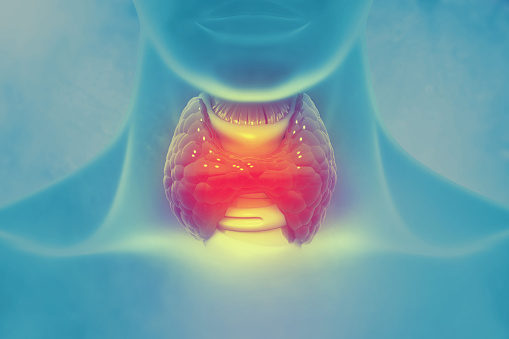Goitre & Thyroid Nodules
WHAT IS A GOITER?
A goitre is an enlarged thyroid gland. A goitre can mean that the whole thyroid gland is swollen or enlarged (Simple Goiter), or one or more swellings or lumps develop in part or parts of the thyroid (Nodular Goiter).
The thyroid gland makes thyroid hormones -called thyroxine (T4) and triiodothyronine (T3). These are carried round the body in the bloodstream. Thyroxine and T3 help to keep the body’s functions (the metabolism) working at the correct pace. Many cells and tissues in the body need thyroxine and T3 to keep them working correctly.
NODULAR GOITERS
A thyroid nodule is a small lump which develops in the thyroid. There are two types.
- A multinodular goitre: This means the thyroid gland has developed many lumps or ‘nodules’.
The thyroid gland feels generally lumpy.
- A single nodule. Causes include
*a cyst (a fluid-filled benign tumour).
*an adenoma (a solid benign tumour).
*a cancerous tumour (rare).
*other rare causes
GOITERS AND THYROID FUNCTION (PRODUCTION OF THYROID HORMONES)
- In many cases, a goitre does not affect the amount of thyroxine or T3 that you make. You are then ‘euthyroid’ which means you make the correct amount of these hormones.
- In some cases, the goitre is associated with an abnormality of thyroid function. You may make too much thyroxine or T3 (hyperthyroidism or overactive thyroid) or too little thyroxine or T3 (hypothyroidism or underactive thyroid).
NOTE: You can also develop an overactive or underactive thyroid without having a goitre.
WHAT ARE THE SYMPTOMS OF A GOITER?
- In many cases, there are no symptoms apart from the appearance of swelling in the neck. The size of a goitre can range from very small and barely noticeable, to very large.
- Most goitres are painless. An inflamed thyroid (thyroiditis) can be painful.
- If your thyroid makes to much or too little thyroxine or T3, this can cause a range of symptoms. See separate leaflets.
- A large goitre may press on the trachea (windpipe) or even the esophagus (gullet) behind the trachea. This may cause difficulty with breathing or swallowing.
ASSESSING THE SITUATION:
When you have a goitre a doctor will usually do some blood test to check if you are making too much or too little thyroxine or T3. Blood tests may also help to find out the causes of some goitres. Other tests may be done to find out the cause of the goitre. For example:
- An ultrasound scan of the thyroid. This may be done if you have a single or multiple nodules. An ultrasound scan is a safe and painless test which uses sound waves to create images of organs and structures inside your body. It can tell if a nodule is a cyst (fluid filled) or a solid lump.
- A small piece of tissue (a biopsy) may be taken from a nodule to look at under the microscope. The biopsy is done by pushing a fine needle into the nodule (a bit like taking a blood sample but the needle is smaller). It is a simple and safe procedure.
- A radioactive iodine scan or similar tests. This may be done to see if any nodules are making too much thyroxine or T3. (The radioiodine concentrates in tissue that makes thyroid hormones.) Nodules that take up iodine (hot nodules) are generally benign but may need treatment as they may cause hyperthyroidism. Nodules that do not take up iodine (cold nodules) may be cancerous (20%) and require more testing or biopsy.
WHAT IS THE TREATMENT FOR A GOITER?
Treatment depends on the cause, the size of the goitre, and whether it is causing symptoms.
For example:
- If you have a small goitre that is not due to a cancerous nodule, and your thyroid is making the correct amount of thyroxine and T3, then you may not need any treatment.
- You will need treatment if you make too much or too little thyroxine or T3.
- An operation to remove some or the entire thyroid may be an option in some cases particularly if you have symptoms related to the goiter.
- Radioactive iodine treatment may be an option for a goitre causing an overactive thyroid. This involves taking a drink, or swallowing a capsule, which contains radioactive iodine. This radioactive iodine builds up in the thyroid gland. As the radioactivity is concentrated in the thyroid gland, it destroys some thyroid tissue (thus shrinking the goitre and correcting thyroid overactivity).
- If you have cancer of the thyroid, you will probably need surgery.
- Iodine replacement, if the goitre is due to lack of iodine in the diet.
FURTHER READING:
This information is for general knowledge & is not a substitute for medical advice from your doctor.
Post Disclaimer
We are not your healthcare provider, and your use of this website does not establish a patient-client relationship. All the information contained on this website is for informational purposes only. No material on this site is intended to be a substitute for professional medical advice (diagnosis, treatment, testing or nutritional information). Always seek the advice of your physician or qualified healthcare provider with any questions you may have regarding medical or health-related conditions or treatment. Your healthcare provider knows your condition or situation well and can give you specific advice which would be appropriate for your condition/situation. Your healthcare provider can also guide you more accurately about injection techniques, dietary interventions and the use of medical technology that is most pertinent and suitable for you. Please do not disregard professional medical advice or delay in seeking it because of something you may have read on this website.

